 Having worked in the field of ageing and been involved in lobbying for a UN convention on the rights of older people for 12 years, taking part in the Open-ended Working Group for Ageing (OEWGA) was a great opportunity for me.
Having worked in the field of ageing and been involved in lobbying for a UN convention on the rights of older people for 12 years, taking part in the Open-ended Working Group for Ageing (OEWGA) was a great opportunity for me.
It allowed me to understand the political thinking and processes that lead to the creation of new mechanisms to protect older people’s rights.
Better protection of older people’s rights
The Red Cross of Serbia is working with HelpAge and is a member of the International Network for the Prevention of Elder Abuse. At the national level, we work with decision makers to highlight the need to better protect older people’s rights.
Following on from Age Demands Action for Rights campaign, which is held on 15 June to mark World Elder Abuse Awareness Day, we visited the Serbian Minister of Foreign Affairs, Mr Ivica Dacic.
We asked Mr Dacic to attend the OEWGA in New York to support a new convention but also to be involved in identifying the best mechanisms of protecting older people from abuse and discrimination. Mr Dacic expressed his interest and understanding for older people’s issues and pledged to do as much as possible to support us.
Support for a UN convention
The Red Cross of Serbia has this year again joined the global action of collecting signatures for the petition related to the new UN convention. In June alone, we collected 4,000 signatures.
Dr Vracevic from the Red Cross of Serbia was invited by UNDESA to take part in a panel discussion on the financial abuse of older women.
He announced a survey we are doing with HelpAge as part of the EU project “Improving Older People’s Access to Human Rights in Serbia” to explore three forms of financial abuse in Serbia, including:
- a family’s legal obligation to support older relatives, which is linked to how older people manage their own income and property
- inheritance and lifelong support contract
- older people’s legal capacity and issues of guardianship.
How do we define financial abuse?
An extract from Dr Vracevic’s presentation:
“Among the many forms of abuse that older people across the world experience, financial abuse is the second most prevalent, right after neglect. Financial abuse is not a narrowly defined phenomenon and consists of many different practices that range from failure to access benefits, inadvertent mismanagement and opportunistic exploitation up to deliberate abuse, often accompanied with intimidation. The lack of a unified definition creates problems in identifying and preventing this abuse.
“Women are more at risk from financial abuse, partially because there are more older women than men, but also because ageing amplifies discrimination that is already part of their experience as women. Women living alone – especially separated and divorced are at an even higher risk.
“The system acts with prejudice in relation to old age, failing to capture the full spectrum of limitations of one’s legal capacity, opting for a simple yes/no decision and thus breaching many a person’s legal rights.
Legal proceedings too costly
“It is important to recognise financial abuse in it many forms and to develop efficient means to prevent it. Once abuse happens, legal proceedings are usually costly, time consuming and out of reach for many victims. This is due to their reluctance to expose themselves to potential additional costs, the feeling of shame for going against their family and, often, the inability to comprehend that she or he is being abused.
“We must work to bring banks and other financial institutions on board – alongside traditional stakeholders – in order to formalise their role in preventing financial abuse. This is especially important bearing in mind online financial transactions and the need for better transparency and accountability in the use of one’s funds.”
Find out more about our work to protect older people’s rights.
